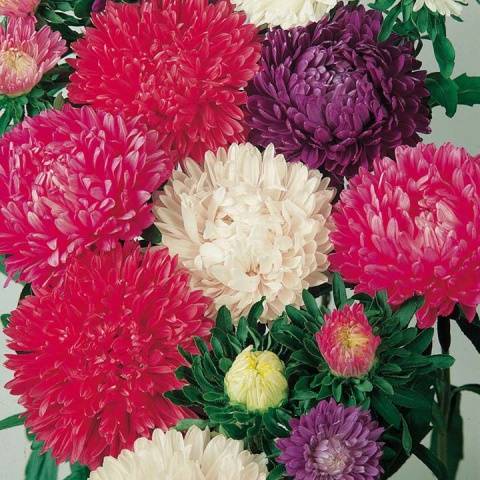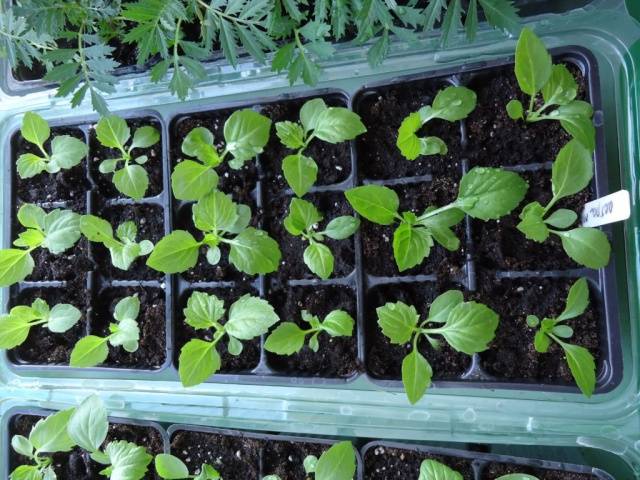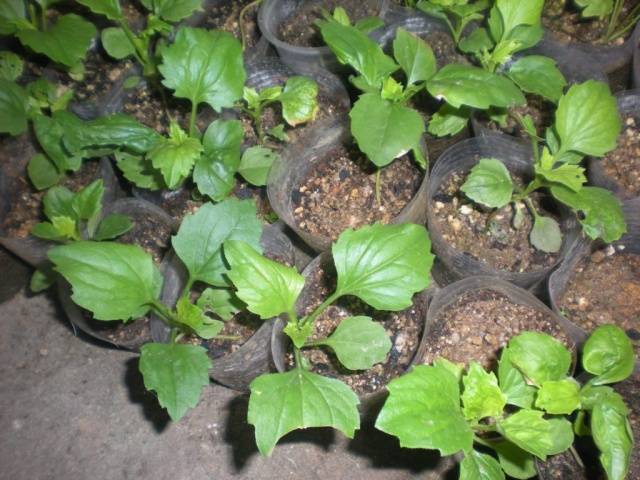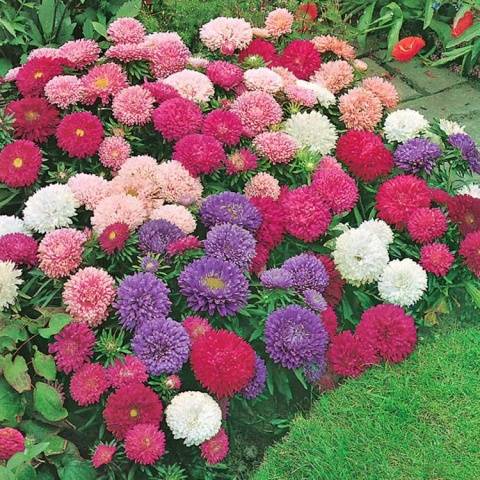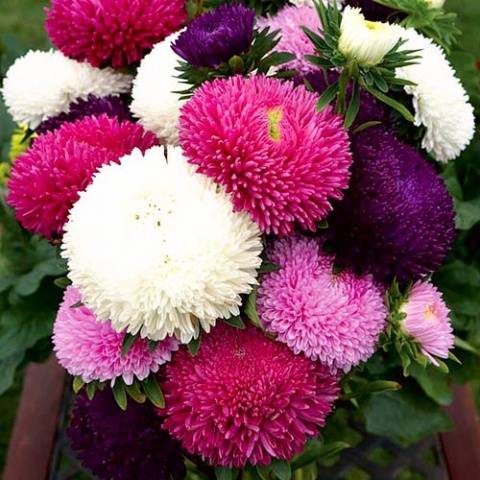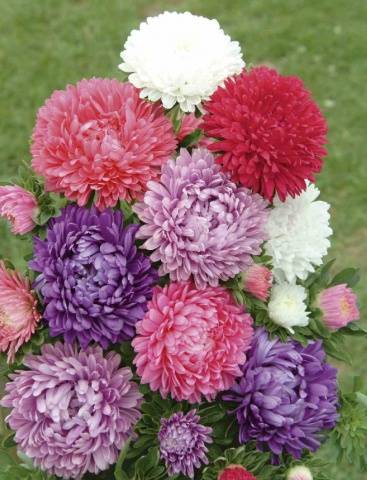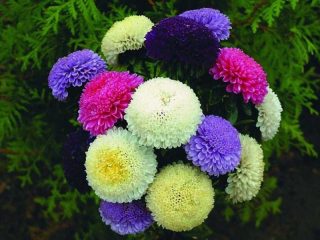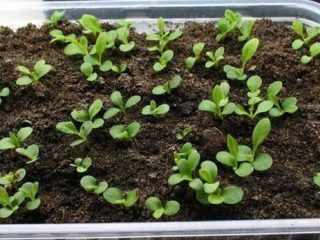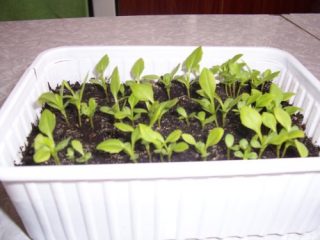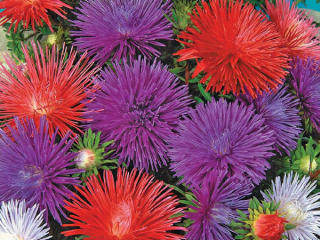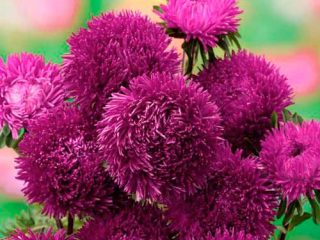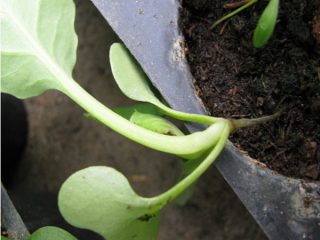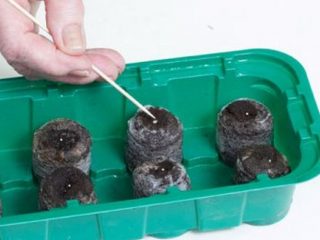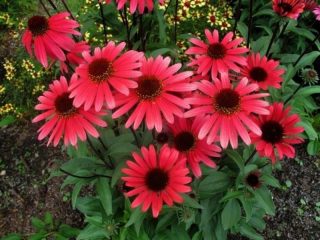Content
Asters are hardy annuals that bloom in late summer and fall. One of the varieties of these flowers are Milady asters. Their compact bushes take up little space in the garden and produce many inflorescences.
The main condition for growing aster is the correct choice of site. The flower grows in sunny areas where there is no accumulation of moisture.
general description
Milady asters include a group of annual varieties of various shades. The plant is herbaceous, low-growing, compact, up to 25 cm high, with simple leaves. Many side shoots extend from the main stem of the flower.
Large spherical inflorescences, reminiscent of a peony in shape, form on the bushes. The petals are double, slightly curved inside the bud. The size of the inflorescences is from 8 to 10 cm. Flowering lasts from July to September.
The Milady aster mixture includes varieties of certain shades:
- pink;
- white;
- red;
- purple;
- blue;
- lilac;
- purple.
Aster Milady is characterized by resistance to diseases and unfavorable climate. Plants tolerate cold weather and are able to grow in garden soil.
Flowering begins 2 weeks earlier than other varieties. Asters can bloom in sunny areas and in partial shade.If necessary, you can replant the bushes; the plants quickly adapt to new conditions.
Milady asters are suitable for decorating borders, mixed borders, and multi-flowered flower beds. Plants are planted along fences and buildings. Planting in pots or flowerpots that can be placed on a loggia or balcony is allowed.
When combining the white aster Milady with bright varieties, contrasting bouquets are obtained. Bouquets composed of monochromatic inflorescences look organic.
Cut flowers do not fade in water for 15 days. They are used to create autumn bouquets. Plants have a strong peduncle and a rich range of colors.
Photo of aster Milady color mixture:
Seedling method
Annual asters are grown from seeds. The most reliable way is to obtain seedlings at home, which are transferred to an open area. To grow flowers, a substrate is prepared, and the seeds are processed. Seedlings are provided with certain conditions to avoid stretching and form healthy plants.
Preparing seeds and soil
When grown from seeds, the Milady aster is planted in March-April. A light fertile substrate is pre-prepared. Its functions will be performed by ordinary garden soil fertilized with humus. Another option is to use purchased land.
Before planting the Milady aster, the soil is steamed in a water bath for disinfection. The soil for plants can be left for several days on the balcony or street at sub-zero temperatures.
Additionally, planting material is dipped in a solution of fungicide or potassium permanganate. Milady aster seeds remain viable for 2 years.It is best to use fresh seeds, then sprouts will appear much faster.
The soil is moistened and poured into boxes or cassettes with cells measuring 3-5 cm. With the cassette method of cultivation, picking seedlings can be avoided.
Plant seeds are placed at intervals of 2 cm and buried 1 cm. A thin layer of soil or sand is poured on top. The containers are covered with plastic film to obtain a greenhouse effect.
Active germination of aster seeds occurs at a temperature of 20 °C. After 10-14 days, shoots will appear. During this period, the film is periodically turned over to provide the plants with access to fresh air. The soil is kept moist.
Milady aster seedlings mixture of colors in the photo:
Seedling care
When shoots appear, the film is removed from the containers. Seedlings of Milady asters are provided with certain conditions:
- temperature 16-18 °C;
- regular ventilation of the room;
- watering with warm water;
- lighting for 12-14 hours.
The soil in containers is watered as it dries. Warm, settled water is used for plants.
If necessary, install additional lighting if the aster seedlings do not have enough natural light. Phytolamps are placed at a distance of 30 cm from the seedlings and turned on in the morning or evening.
When the first pair of leaves develops, asters dive into separate containers. If cassettes were used, then picking can be avoided.
3 weeks before transferring to a permanent place, the plants are hardened. First, open a window in the room for 2-3 hours to ensure an influx of fresh air.
Then the containers with seedlings are transferred to the loggia or balcony. As a result, plants will be able to quickly adapt to new conditions.
Landing in the ground
Asters are planted in open ground in mid-May. The flower prefers well-drained, light soils and well-lit areas.
Aster does not tolerate stagnant moisture, so the flower garden is set up on a hill or a flat area. The planting site is prepared in the fall, when the soil is dug up and humus or compost is added.
Holes are prepared for planting plants. They are placed in increments of 30 cm. 35 cm are left between the rows of asters. The seedlings are transferred to planting holes, the roots are covered with earth. The last step is to water the plants abundantly.
Photo of aster Milady after the pick:
Seedless method
In the southern regions, when growing Milady aster, the seeds are planted in open ground in spring or autumn. Seeds take longer to germinate under natural conditions. Therefore, flowering dates may shift. When planting in winter, the planting material undergoes natural stratification, and the plants quickly sprout in the spring.
Spring planting
Before planting asters in open ground, keep the seeds in warm water for 24 hours. To carry out the work, choose a warm day in May or June.
Furrows are made on the surface of the soil with a depth of no more than 1.5 cm. The seeds are placed in 10 cm increments, a thin layer of soil is poured on top and the bed is watered abundantly.
If there is a possibility of frost, the plantings are covered with foil overnight. The emerging shoots are thinned out. When the flowers grow, they can be planted around the site.
Winter landing
Milady asters are planted in the fall in October-November.Winter-bearing plants are resistant to diseases and weather conditions.
For planting, prepare furrows 1-2 cm deep, over which the seeds are scattered. Sprinkle soil and a layer of mulch from compost or dry leaves on top. In winter, under the influence of low temperatures, plant seeds will undergo natural stratification.
After the snow melts, the mulch is removed. Until the end of frost, asters are kept under agrofibre. Grown flowers are thinned out or planted.
In the photo there are Milady asters in a flowerbed:
Flower garden care
Asters require minimal care, including the addition of moisture and nutrients. To keep your flower garden looking well-groomed, you need to weed it regularly. weeds. Diseases and pests rarely affect these plants; special preparations are used to protect against them.
Watering
Asters are watered as the soil dries. Stagnation of moisture is detrimental to plants, as the root system rots. With insufficient watering, asters dry out and the inflorescences lose their decorative effect.
The intensity of watering is increased during drought. You need to water the flower garden with warm, settled water. Morning and evening hours are best for watering aster.
After watering the plants, the soil is loosened to a depth of 5 cm to enrich the soil with oxygen and improve the absorption of moisture and nutrients. Be sure to weed out the weeds.
Top dressing
In poor soils, aster lacks nutrients. For feeding, solutions consisting of mineral components are prepared.
Scheme for feeding aster variety Milady:
- 2-3 weeks after transfer to an open area;
- when the first buds appear;
- before abundant flowering begins.
The first plant feeding includes 30 g of urea, 20 g of potassium sulfate and 40 g of superphosphate. The substances are dissolved in 10 liters of water, after which the plantings are watered at the root. Milady asters do not respond well to the application of fresh organic fertilizer: mullein or bird droppings.
For subsequent treatments of the flower garden, similar solutions are prepared, with the exception of urea. Phosphorus and potassium strengthen the root system of plants, promote abundant flowering, and increase resistance to bad weather and diseases.
Pink, purple and white aster Milady in a bouquet:
Diseases and pests
If agricultural practices are followed, Milady asters rarely get sick and are little susceptible to attack by pests. Diseases appear with high humidity and the use of low-quality planting material.
The most dangerous disease for flower gardens is fusarium. It is spread by a fungus that causes plants to wilt. There are no effective treatments against fusarium, so special attention is paid to its prevention.
On acidic soils, Milady asters suffer from blackleg. Plant stems begin to rot at the base. After removing diseased bushes, the soil is disinfected with a solution of potassium permanganate.
For the Milady aster, the greatest threat is posed by meadow bugs, slugs, spider mites, cutworms and aphids. Insects carry diseases and feed on plant sap or roots. As a result, the flower dies.
The insecticides Fundazol, Karbofos, and Pyrethrum are used against pests. Based on them, preparations are prepared for spraying plantings.
Autumn care
As the inflorescences and leaves of the asters fade, they are removed. After flowering, annuals are dug up and burned to eliminate possible pests and pathogens.
First, you can collect seeds for planting next year. To do this, you should wait until the inflorescences fade and darken. Seeds with fluff will appear in the center of the aster. Planting material is stored in a paper or fabric bag.
Conclusion
Astra Milady is an ideal option for decorating multi-flowered flower beds and autumn bouquets. The plant is unpretentious and tolerates drought and temperature fluctuations without problems. Using a mixture of colors allows you to grow flowers of different colors.
Asters are propagated by seeds. In cool climates, seedlings are first obtained and transferred to flower beds. Under favorable weather conditions, you can plant the seeds immediately in a permanent place. Caring for plants includes watering, loosening the soil and periodic feeding.
